Reyner Banham Loves Los Angeles (1972)
Alison Fisher and Greg Foster-Rice
Jan 08, 2015
(6pm)
Screening
Please RSVP
Reyner Banham Loves Los Angeles (1972) is a 50-minute film devoted to exploring the British architectural historian’s love affair with this uniquely American city. Banham roams the “four ecologies” of Los Angeles—beach, freeways, foothills, and basin—first presented in his 1971 book, with the playful assistance of “Baede-Kar” (an 8-track audio tour that parodies the 19th century German guidebooks published by Karl Baedeker). Along the way, he tours the Watts Towers, riffs on Googie architecture with artist Ed Ruscha, visits the unusual characters of Venice Beach, and meanders the highways with a giddy enthusiasm that knowingly celebrates the city’s sprawl and indecipherability, the very qualities derided by conventional critics of architecture and urbanism. The combination of Banham’s passion for history and pop culture and the film’s period footage, music, and cameos with local personalities makes for an entertaining and insightful tour through 1970s Los Angeles.
This film is presented in conjunction with the Graham-funded exhibition The City Lost and Found: Capturing New York, Chicago and Los Angeles, 1960-1980 on view at Art Institute of Chicago through January 11 and opening at the Princeton University Art Museum February 21. The screening will include introductory remarks by exhibition curators Alison Fisher and Greg Foster-Rice.
Alison Fisher is Harold and Margot Schiff Assistant Curator of Architecture and Design at the Art Institute of Chicago. With a focus on heterodox histories of modern architecture and urbanism, she has curated numerous exhibitions including the retrospective Bertrand Goldberg: Architecture of Invention (2011-12). She is the co-curator of The City Lost and Found: Capturing New York, Chicago and Los Angeles, 1960-1980.
Greg Foster-Rice is an Associate Professor at Columbia College Chicago, where he teaches the history, theory and criticism of photography. He has published extensively on the relationship of photographic media to the built environment, including co-editing and co-authoring the anthology Reframing the New Topographics (2011). He is the co-curator of The City Lost and Found: Capturing New York, Chicago and Los Angeles, 1960-1980.
Image: "Reyner Banham Loves Los Angeles," 1972.

Volatile Smile
Beate Geissler, Oliver Sann, Brian Holmes, and Karen Irvine
Dec 10, 2014
(6pm)
Talk
Please RSVP
What made Chicago a center of speculative culture—a culture which so rapidly emerged as the “non-place” where cybernetic logic bears it strangest and perhaps most powerful fruits?
On December 10, artists Beate Geissler and Oliver Sann, art critic Brian Holmes, and curator Karen Irvine will discuss their new Graham-funded book Volatile Smile, which investigates the impact of technology on systems of global commerce. An elucidating collage of text and images, Geissler and Sann’s latest project provides fundamental and unprecedented insights into the mutual impact of real and cybernetic architecture, with Chicago as its archetype. Published by Moderne Kunst Nurnberg, Volatile Smile includes images, otherwise unseen, from the operating centers of Chicago's financial industry and features essays by Brian Holmes, sociologist Karin Knorr Cetina, and eco-sociologist Dirk Baecker.
Following the event, please join us for a holiday reception in the Graham Foundation’s galleries and bookshop, which will be offering a special discounts of up to 40% off. Copies of Volatile Smile will be available for purchase at the Graham's Bookshop.
Beate Geissler and Oliver Sann were born in Germany and live and work in Chicago. Geissler received an MFA from the Hochschule für Gestaltung in Karlsruhe, while Sann received his MFA from the Academy of Media Arts in Cologne. Their work has been exhibited nationally and internationally in museums, galleries, and alternative spaces, including the Renaissance Society at the University of Chicago; the Museum of Contemporary Photography, Chicago; the Fotomuseum Antwerp; the NGBK (New Society for Visual Arts) in Berlin; the National Taiwan Museum of Fine Arts; the Fotomuseum Winthertur in Switzerland; and the Museum Ludwig in Cologne. They have received numerous grants and awards, including the Videonale Award from the Museum of Art, Bonn, Germany; the Herman-Claasen-Award (Cologne, Germany); and the Dean's Research Prize, from the School of Art and Design, University of Illinois at Chicago. They have published two monographs Return to Veste Rosenberg (2006) and Personal Kill (2010). Currently, Geissler is associate professor of art at the University of Illinois at Chicago and Sann is assistant professor at the School of the Art Institute of Chicago.
Brian Holmes is an art critic, activist and translator, living in Chicago. He is interested primarily in the intersections of artistic and political practice. He holds a doctorate in Romance Languages and Literatures from the University of California at Berkeley. Brian Homes was the English editor of publications for Documenta X, Kassel, Germany since 1997. Brian was a member of the graphic arts group 'Ne pas plier' from 1999 to 2001, and has recently worked with the French conceptual art group 'Bureau d'Études'. He is currently professor of philosophy at the European Graduate School in Saas-Fee, Switzerland.
Karen Irvine is Curator and Associate Director of the Museum of Contemporary Photography at Columbia College Chicago. She has organized over forty exhibitions of contemporary photography, at the MoCP and other venues including the Hyde Park Art Center; Rockford Art Museum; Lishui International Photography Festival, China; Daegu Photography Biennale, South Korea, and the New York Photo Festival.
Image: Beate Geissler and Oliver Sann, Chicago Board of Trade, a, 2013. Courtesy of the artists.
Related Grant: Beate Geissler and Oliver Sann, Volatile Smile (Verlag für moderne Kunst, 2013).

Intersection: A Dialogue between Architecture and Dance
Ginger Farley and Julie Hacker
Dec 06, 2014
(10am)
Workshop
Former dancer and choreographer Ginger Farley and architect Julie Hacker FAIA will run a one-day workshop to explore the intersection between dance and architecture. A small group of dancers and architects will be invited to participate with the goal of extending the dialogue between the two disciplines.
Ginger Farley has been a dancer, dancemaker, teacher, and advocate for live art since 1978. An early member of Hubbard Street Dance Chicago, she later directed her own company, The 58 Group, with colleague Cameron Pfiffner. Farley now leads the Chicago Dancemakers Forum, practices dramaturgy, and mentors emerging artists. She is a member of the Performance Programs Committee at the MCA, the advisory committee for the School of Theater and Music at UIC, space and programming committees at Links Hall, the advisory board for Arts in Sacred Places, and serves on the Board of Directors at Arts Alliance Illinois.
Julie Hacker is a practicing architect and a Fellow of the American Institute of Architecture. She is a graduate of Wesleyan University, where she majored in psychology and minored in dance, with a strong interest in choreography, which she pursued in New York after college. She returned to Chicago and received her Masters in Architecture at the University of Illinois Chicago, where she was the recipient of the Chicago Women in Architecture Award. She has been a practicing architect for the last 28 years. Her firm Stuart Cohen & Julie Hacker Architects specializes in residential work and has been published nationally and internationally. The work of her practice is the subject of a recent book, Transforming the Traditional, published in 2009.
Please Note: This is a closed event. If you are interested in participating in future workshops, please contact us at mkhimm@grahamfoundation.org.
Image: Kari Job and Jay Franke in a performance by the 58 Group at HotHouse, 2000. Photo: Brian Hill.

Collective Creativity and the Participatory City
Eva J. Friedberg and Alison Hirsch
Dec 04, 2014
(6pm)
Talk
Please RSVP
In conjunction with the exhibition Experiments in Environment: The Halprin Workshops, 1966-1971, the Graham Foundation is pleased to present the Chicago launch of the Graham-funded book City Choreographer: Lawrence Halprin in Urban Renewal America by landscape architectural designer and urban historian Alison Hirsch. Hirsch will be joined by fellow grantee, architectural historian Eva J. Friedberg to discuss the influences, development, and impact of Anna and Lawrence Halprins’ collaborative workshops.
Friedberg will trace the origins of the Halprins’ partnership, highlighting the parallels between architecture and dance, and the culmination of the couple’s collaborative practice within the setting of the "Experiments in Environment" workshops. Then, Hirsch will then discuss the impact of these workshops on Anna and Lawrence’s subsequent work in the urban context of the late 1960s and 1970s, emphasizing the development and application of Lawrence Halprin's "Take Part" workshop process.
Copies of City Choreographer: Lawrence Halprin in Urban Renewal America (University of Minnesota Press, 2014) are available for purchase in the Graham Foundation Bookshop.
Eva J. Friedberg is a modern art and architecture historian on adjunct faculty at the University of San Diego and Woodbury University School of Architecture. Her essay on the Experiments in Environment workshops, “Collective Movement: Anna and Lawrence Halprin’s Joint Workshops,” appears in the 2012 anthology West of Center: Art and the Counterculture Experiment in America, 1965-1977, published by the University of Minnesota Press. Friedberg’s doctoral dissertation on the early work of Lawrence Halprin closely examines the designer’s development of the RSVP Cycles as a new method for organizing human creative processes and as a guide to collective creativity.
Alison Hirsch is a landscape architectural designer as well as urban historian and theorist. She is Assistant Professor of Landscape Architecture at the University of Southern California and co-founder and partner of Foreground design agency. Her book City Choreographer: Lawrence Halprin in Urban Renewal America was released by University of Minnesota Press in April 2014. The book provides an analysis of the creative process Lawrence Halprin developed with his wife, dancer and choreographer Anna Halprin, and how aspects of this process have the potential to enrich contemporary approaches to structuring the city.
Related Grants: Alison Hirsch, City Choreographer: Lawrence Halprin in Urban Renewal America (University of Minnesota Press, 2014); and Eva Jessica Friedberg, "Action Architecture: Lawrence Halprin's Experiments in Landscape Design, Urbanism, and the Creative Process."
Image: Photographer unknown, participants in “Experiments in Environment," a creativity workshop that served as an experimental precursor to Lawrence Halprin & Associates’ Take Part Process, a community participation methodology, 1966, Kentfield, CA. Courtesy of the Lawrence Halprin Collection, the Architectural Archives, University of Pennsylvania.
For more information on the exhibition, Experiments in Environment: The Halprin Workshops, 1966-1971, click here.

The Sea Ranch: Community with a Score
Donlyn Lyndon
Dec 02, 2014
(6pm)
Talk
Please RSVP
The Sea Ranch is a residential development that stretches ten miles along the Northern California Coast. Beginning in 1963, the American landscape architect Lawrence Halprin led a diverse, cross-disciplinary team of professionals, which included architects Joseph Esherick & Associates and MLTW (Moore Lyndon Turnbull Whitaker), in planning the early development of The Sea Ranch. Their work, acclaimed as early ecological planning and architecture, was published and emulated internationally.
Embodying the ideals of the team, the early work at The Sea Ranch was guided by group meetings, workshops, and a “Locational Score” drawn by Lawrence Halprin. As the project developed, incrementally and with a changing cast of authors, the qualities varied, but Halprin’s Score remains a point of reference. Subsequent workshops led by Halprin and more recent ones conducted by the Commons Landscape Committee have continually added to the understanding of the place and the need for tending a dynamic landscape.
On December 2, Donlyn Lyndon, FAIA, one of the founders of MLTW will discuss the nature of The Sea Ranch and the architecture that has developed there. His talk will draw in part from his acclaimed book The Sea Ranch: 50 Years of Landscape, Architecture, Place and Community on the Northern California Coast (with Jim Alinder, Princeton Architectural Press, 2014) and a recent Architectural Forum panel that Lyndon helped organize and chair for The Sea Ranch 50th Birthday Celebration.
Donlyn Lyndon, FAIA, is the Eva Li Professor Emeritus of Architecture and Urban Design at University of California, Berkeley, and previously headed the Departments of Architecture at MIT and the University of Oregon. In 1997, he received the AIA/ACSA Topaz Award for Excellence in Education. The Sea Ranch Condominium One, which he and his partners in MLTW (Moore Lyndon Turnbull Whitaker) designed, won the distinguished AIA 25 Year Award and is listed on the National Register of Historic Places. Lyndon remains active in practice and has also authored or coauthored numerous publications, including The Place of Houses (University of California Press, 2000); The City Observed: Boston (Vintage, 1982); Chambers for a Memory Palace (The MIT Press, 1996); and most recently, The Sea Ranch: 50 Years of Architecture, Landscape, Place and Community on the Northern California Coast (with photographs by Jim Alinder, Princeton Architectural Press, 2014).
Image: Anna Halprin conducting a "Score for Building Community" at The Sea Ranch, Sept 1, 2014. Photograph by Jim Alinder.
For more information on the exhibition, Experiments in Environment: The Halprin Workshops, 1966-1971, click here.

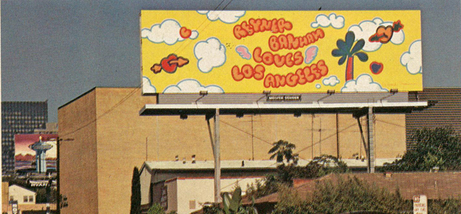
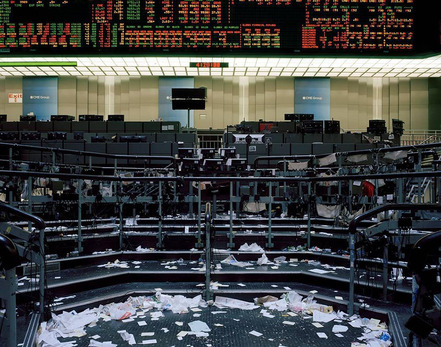
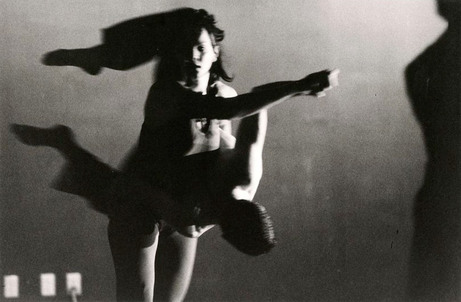
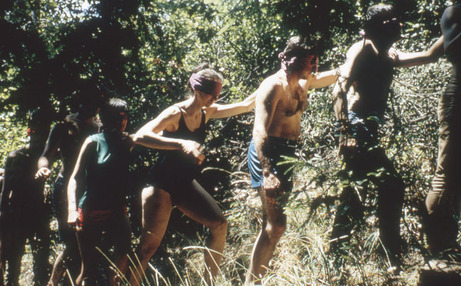
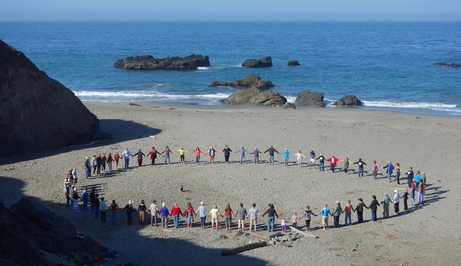
 PREVIOUS POSTS
PREVIOUS POSTS